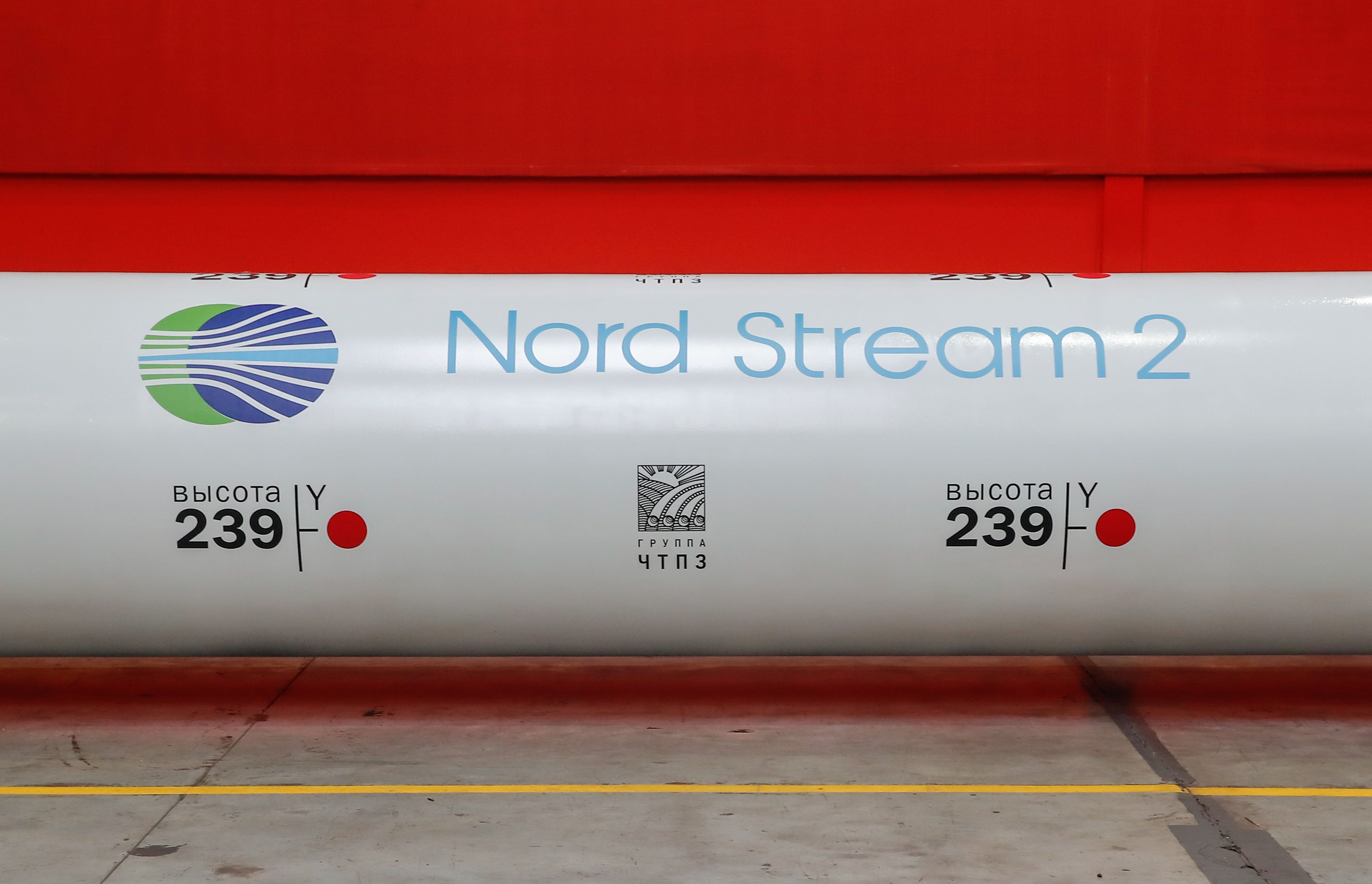Implications of Nord Stream 2's Completion for Ukraine
Commissioning of the Nord Stream 2 (NS2) gas pipeline will lead to a halt in the transit of Russian gas to the EU via Ukrainian territory, which will have a negative impact on Ukraine’s security and fiscal situation. Germany, the main promoter of NS2 in the EU, managed to persuade the U.S. administration to allow the project to be finalised in exchange for promises of German-American support for Ukraine. The real aim of the German initiative, however, is to defuse the controversy surrounding NS2 rather than to provide tangible support for Ukraine. The planned compensation does not adequately consider the security implications for the country of the construction of the pipeline.
 .
.
There is consensus on the Ukrainian political scene about the threat posed by NS2 and the need to stop it. However, Ukraine does not have effective instruments to prevent the pipeline from being completed—only sanctions by the U.S. had any chance to do so. However, the Biden administration, which is striving to improve relations with Germany, is not in favour of such radical actions, although sanctions on NS2 are supported by a significant portion of Congress.
Consequences of a Completed NS2 for Ukraine
The level of transit of Russian gas through Ukraine is determined by the agreement of 30 December 2019, concluded following negotiations in the EC-Ukraine-Russia format. It is favourable for Ukraine since even if Gazprom sends smaller volumes of gas than agreed (65 bcm in 2020 and 40 bcm per year until 2024), it obliges the Russian company to pay for the transit of the volumes specified in the agreement. Under this contract, the Gas Transmission System Operator of Ukraine (GTSOU) receives about $1.5 billion a year, which is the company’s main source of revenue. However, the contract does not guarantee the continuation of transit through Ukraine after its expiries (31 December 2024), and the commissioning of NS2 will allow Russia to bypass Ukraine’s gas pipelines entirely. In that case, GTSOU will most likely begin to generate losses, which will make it difficult for it to implement planned investments necessary to adapt the system to work without gas transit from Russia (e.g., adapting compressor stations to work in reverse flow).
The loss of transit profits will not cause the Ukrainian state budget to collapse as the taxes paid by the GTSOU accounts for about 1.5% of revenues. However, in the longer term, the lack of such income will have to be compensated by an increase in tariffs for users and by state support. Suspension of transit will also lead to an increase in the price of gas purchased by Ukraine on the European market (Ukraine has not been buying gas from Russia since 2015) due to the virtual reverse flow being prevented (this mechanism involves purchasing an amount of natural gas from Gazprom’s EU customers and withdrawing it from the transmission system in Ukraine before it is shipped to Europe). An increase in gas prices could weaken support for President Volodymyr Zelensky and his Servant of the People party. Utility fees are considered by more than 40% of Ukrainians as one of the biggest problems in the country, and households as a group comprise the largest consumer of gas in Ukraine.
The commissioning of NS2 will strengthen economic and political ties between Russia and Germany. German politicians who advocate closer cooperation with Russia, not only economically but also politically, are supporters of NS2’s completion. This in turn will make it easier for the Russian government to lobby against EU sanctions, German military support for Ukraine, or an assertive German response if Russia escalates the conflict with Ukraine. Halting transit further reduces the costs of a possible wider Russian invasion of Ukraine, as military action near gas transmission pipelines would not affect the continuity of gas supplies to the EU.
Ukraine and the Germany-U.S. Agreement
Negotiations on possible compensation to Ukraine for the construction of the gas pipeline are taking place between Germany and the U.S., but without Ukrainian participation. These talks resulted in an agreement on 21 July under which, in return for the Biden administration’s withdrawal from sanctions on NS2, Germany “commits to utilise all available leverage to facilitate an extension of up to 10 years to Ukraine’s gas transit agreement with Russia” and to oppose any use of energy blackmail by Russia. Germany, together with the U.S., is also to provide investments of $1 billion in Ukraine’s energy transition, including the development of renewable energy sources, hydrogen production, and increased energy efficiency. The American consent to complete the pipeline means that it is likely to be done without further delays.
Despite opposing NS2, Ukrainian leaders do not openly criticise the agreement. They rather treat it as framework agreement and expect more specific agreements on its implementation, especially from the German side. According to Ukrainian Minister of Foreign Affairs Dmytro Kuleba, these commitments should be more binding to discourage Russia from using NS2 for political purposes. At the same time, Ukraine aims to prevent the launch of the pipeline, for example, by denying technical certification. Some in the U.S. Congress are allies of Ukraine in this matter: they demand the U.S. imposes sanctions on NS2. The chair of the Senate Foreign Relations Committee, Bob Menendez, a member of President Joe Biden’s Democratic Party, together with representatives from Ukraine’s parliament and other parliaments in Europe (including Poland’s) criticised the U.S.-Germany deal. In a joint statement, they called for wider consultations within NATO, as well as opening the way for Ukraine to join NATO and the EU.
Ukraine also presents its own expectations regarding compensation, with President Zelensky discussing the future of NS2 during his meeting with German Chancellor Angela Merkel in Kyiv on 22 August and with President Biden in Washington on 30 August. Ukrainian diplomacy focuses on the security harm of NS2. According to Foreign Minister Kuleba, proper compensation for a halt in gas transit would be the return to Ukraine of its territories occupied by Russia or security guarantees and the withdrawal of Russian forces from Donbas. The GTSOU chief for his part proposed a 15-year agreement on the transit of 45–50 bcm of gas each year with financial guarantees from European banks. Ukrainian state-owned company Naftogaz, in its talks with Germany, has raised the issue of Gazprom’s violation of EU competition law by blocking gas imports from Central Asia through Russia to Ukraine (and possible further transit to EU). There are also proposals by Ukrainian experts to deliver additional military equipment to Ukraine to strengthen its capabilities and counter, for example, the threat from Russia.
Conclusions and Perspectives
The NS2 deal should have considered the wider implications of the new pipeline for Ukraine. Germany will now have no tools to force Russia to continue gas transit via Ukraine after 2024, and imposing either German or EU sanctions on Russia for using NS2 as a political tool against Ukraine will be nearly impossible. On the other hand, closer Russian-German cooperation will weaken Germany’s readiness to counter Russia’s aggressive policy, which in turn might encourage Russia to escalate the conflict in the Donbas.
At the same time, once gas deliveries via NS2 are started, imposing effective U.S. sanctions on companies importing it will not be possible since that would impact European receivers. For this same reason, after NS2’s commissioning, Russia will not have to worry about U.S. sanctions on the pipeline. Some of the agreement’s elements, like supporting Ukraine’s energy transition, could be beneficial for the country, it but should not be regarded as part of the solution to NS2’s threats. For instance, Germany also supports energy transition cooperation with Russia.
President Zelensky is aiming for an international success to offset the possible blow to his image over the loss of gas transit to NS2. He will most likely strive to get for Ukraine the status of a major non-NATO ally. In the long run, Ukraine could also reverse some of its gas market reforms (e.g., re-introduce regulated prices), so households are protected from higher prices. The Ukrainian authorities would likely justify this by arguing that the EU violated the solidarity principle. That would weaken the cooperation between Ukraine and the IMF, in turn harming Ukraine’s economy since introducing market-based gas prices is one of the requirements for IMF financial support.
The proposed compensation for Ukraine does not adequately take into account the security threats of NS2. Poland, together with other like-minded countries, might pressure states for compensation that boosts Ukraine’s defence capabilities to deter Russia from escalating the conflict. This would mean additional supplies of military equipment for the Ukrainian military or German financial aid for purchasing it.



